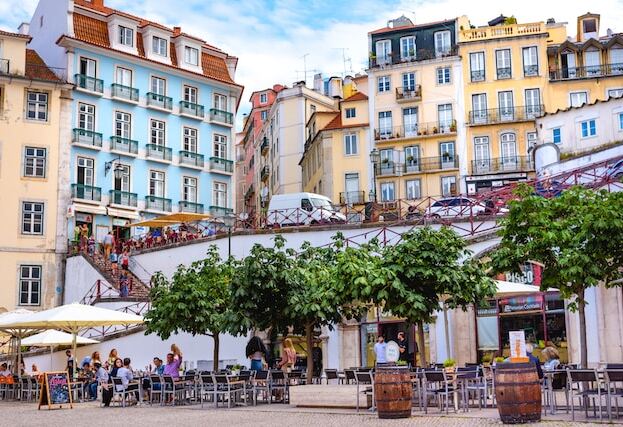Lisbon, the capital of Portugal, offers a unique blend of history, culture, and modern charm. Known for its scenic hillsides overlooking the Tagus River, Lisbon captivates visitors with its old-world charm and contemporary vibes. The city’s historic neighborhoods, such as Alfama and Bairro Alto, are famous for their narrow cobblestone streets, vibrant street art, and traditional Fado music that fills the air.
Lisbon’s architectural wonders include the Belem Tower and Jerónimos Monastery, both UNESCO World Heritage sites, and also boasts a lively culinary scene, from its iconic pastéis de nata to fresh seafood dishes. If that doesn’t entice you to relocate to Portugal’s capital city, in this article we’ll take a look at why you should consider Lisbon as your retirement destination.
What are the Benefits of Retiring in Lisbon?
1. Portugal Ranks Among the Top Retirement Destinations

To help you navigate this crucial decision, our Global Intelligence Unit released an in-depth report on US retirement trends, factoring in aspects such as cost of living, tax optimization, and political stability that are crucial for retirees. While Spain topped the rankings in 2024, Portugal came in second.
Why do many choose to retire in Portugal over other countries like Italy or Canada? Well, according to the report, many American retirees prefer countries where their pensions can cover more expenses, taxes are lower, and the political situation is stable and predictable.
These internal motivations often combine with external desires such as pleasant weather and the enriching experience of immersing oneself in new cultures and being part of local communities – all of which Portugal has in abundance.
Moreover, some retirees are motivated by the prospect of acquiring a second citizenship, which provides practical benefits like easier travel and access to social services in other countries. This trend aligns with the increasing global mobility and globalization of retirement lifestyles.
2. Affordable Cost of Living
Lisbon provides a relatively affordable cost of living compared to other Western European capitals. Retirees can take advantage of lower housing costs, whether renting or buying property. Groceries, dining out, and public transportation are also more affordable.
Utilities, healthcare, and other essential services tend to be less expensive, allowing retirees to maintain a comfortable lifestyle without straining their finances. Many retirees find they can live well on a moderate budget and enjoy the city’s amenities and activities.
Lisbon’s affordability also extends to leisure activities, with reasonably priced tickets for museums, theaters, and cultural events. This cost-effectiveness, combined with a good quality of life, makes Lisbon an attractive destination for those looking to retire abroad.
3. Real Estate Options for Retirees

Whether it’s historic apartments in the city center or modern developments in quieter neighborhoods, there are choices to suit different lifestyles and preferences.
While the city has experienced a real estate boom in recent years, prices remain relatively affordable compared to other Western European capitals. Retirees can choose from options like riverfront properties, suburban homes, or charming townhouses in scenic areas.
Additionally, Lisbon’s real estate market includes several investment properties well-suited for renovation, offering retirees a chance to customize their living spaces. The variety of available housing ensures that retirees can find a home that fits their needs and budget.
4. Tax Incentives for Foreign Retirees

Additionally, certain types of foreign income, such as dividends, interest, and royalties, may be exempt from Portuguese taxes.
These incentives are designed to attract retirees and other skilled professionals to Portugal, making it financially advantageous to retire in Lisbon. This program, combined with the relatively low cost of living, allows retirees to maintain a comfortable standard of living.
Even though the program has officially closed, it’s still possible for some individuals to apply up until March 31, 2025. However, the eligibility requirements for this deadline are more stringent. To qualify, it’s necessary to meet at least one of the following criteria:
- Having an employment contract signed/to be signed by December 31, 2023
- Having a lease agreement or other contract for the use/possession of property signed by October 10, 2023
- Having a contract to buy property in Portugal signed by October 10, 2023
- Having children enrolled or registered in a school in Portugal by October 10, 2023
- Having a residence visa or a residence permit valid from December 31, 2023
- Having an application for a residence visa or residence permit initiated by December 31, 2023
- Being a member of the household of anyone who meets the above criteria
Anyone who qualifies under these conditions will have NHR status from the date that they become a tax resident — whether that’s in 2024 or in the first quarter of 2025 — until December 31, 2033.
5. Access to Quality Healthcare
Retirees in Lisbon have access to high-quality healthcare services, both in the public and private sectors. Portugal’s public healthcare system is generally considered reliable, with well-trained medical professionals and modern facilities.
Retirees from the European Union can benefit from reciprocal healthcare agreements, while non-EU retirees often opt for affordable private health insurance. Private insurance provides access to a wider range of services and shorter waiting times.
Lisbon is home to several top-rated hospitals and specialized clinics, ensuring comprehensive medical care is readily available. The city’s healthcare infrastructure is complemented by a growing number of English-speaking healthcare professionals, which is a significant advantage for foreign retirees. This accessibility to quality healthcare contributes to peace of mind and a comfortable retirement experience.
6. Safety and Low Crime Rates

Violent crime is relatively rare in Lisbon, and the city’s most common offenses tend to be minor, such as pickpocketing or petty theft, primarily in tourist-heavy areas. The atmosphere is tranquil, and most neighborhoods offer a sense of safety and community, even after dark.
The local police force, the Polícia de Segurança Pública (PSP), maintains a visible presence throughout Lisbon, particularly in areas frequented by tourists and expatriates, such as the historic districts and popular shopping streets. This visibility helps deter crime and provides a sense of security to residents and visitors alike.
In addition, Lisbon’s community policing initiatives, which focus on building trust and cooperation between police and local communities, have effectively maintained low crime rates and promoted safety.
For retirees, the sense of safety is further enhanced by Lisbon’s well-maintained infrastructure, including good street lighting, pedestrian-friendly pathways, and reliable public transportation.
The city’s efficient public transportation network, comprising buses, trams, and metro lines, allows retirees to move around comfortably and securely, reducing the need for car ownership and minimizing risks associated with driving.
7. Mediterranean Climate Year-Round
Portugal’s capital city has a mild Mediterranean climate. It has warm summers and mild winters, making it an ideal place for year-round living. The city enjoys over 2,800 hours of sunshine annually, providing plenty of opportunities for outdoor activities.
Winters are typically mild, with average temperatures ranging from 8°C to 15°C, while summers are warm but not excessively hot, averaging between 18°C and 28°C. This consistent weather allows retirees to enjoy various outdoor pursuits, such as walking, golfing, or exploring the city’s historic neighborhoods. The pleasant climate also promotes a healthier lifestyle, encouraging outdoor socializing and regular physical activity, both of which are beneficial for retirees.
Retirement Visa for Portugal
An excellent option for non-EU citizens seeking to retire in Portugal is the D7 Visa. Also known as the Portuguese Passive Income Visa, it allows foreigners to reside in Portugal legally, provided they have a stable source of passive income.
A passive income means that you are not actively working to earn it, and it can be generated from pensions, real estate, transferable equity, intellectual property, or financial investment. Most importantly, your monthly passive income needs to exceed the Portuguese minimum wage.
Holders of the Portugal D7 Visa will be granted a temporary residence permit valid for two years, which can be renewed for a three-year period. After this, the residence permit can be converted into a permanent residency card.
After a five-year period of holding a legal residence permit under the D7 Visa regime, retirees can obtain their permanent residence permit in Portugal. They can also apply for Portuguese citizenship and a Portuguese passport, provided they fulfill the requirements in Portuguese law.
Retirement D7 Visa eligibility criteria
- Be a non-EU national
- Earn a passive income of at least €870.00 per month (your income can come from pensions, transferable equity, real estate, intellectual property, or financial equity)
- Show proof of a place to live in Portugal.
- Be willing to reside in Portugal for over183 consecutive days per calendar year.
D7 Visa requirements
To apply for a retirement visa for Portugal, you must have the following documents:
- Completed D7 Visa application form
- Valid passport
- Two passport photos (passport-sized)
- Proof of passive income
- Proof of adequate accommodation (12-month lease agreement)
- Criminal record background check
- Valid travel insurance with healthcare services
- Three months of bank statements
- Last year’s tax statement
You’ll have to submit all required documents to the Portuguese Consulate in your country of residence or VFS Global (if you don’t have access to a Portuguese Embassy or consulate in your home country). If your visa application is approved, the Portuguese Consulate will issue the D7 Visa, allowing you to travel to Portugal and grant you an appointment at AIMA to formalize the residence permit request.
Why choose Global Citizen Solutions for your Immigration Visa?
GLOBAL APPROACH BY LOCAL EXPERTS
- GCS has offices located across Portugal.
- Members of the US-Portugal and UK-Portugal Chambers of Commerce in Portugal, and the Investment Migration Council (IMC).
- Our expert team can help you throughout your journey to secure your Visa.
100% APPROVAL RATE
- Our successful track record in applications provides reassurance to applicants.
- We have helped clients from more than 35 countries secure residency in Portugal.
ALL-ENCOMPASSING SOLUTION
- With a single channel of communication, our approach ensures that you have complete clarity on your application.
- Our BeGlobal® Onboarding System allows for a total flow of information.
TRANSPARENCY AND PRIVACY
- Our pricing is clear and detailed, you will not face any hidden costs.
- All data is stored within a GDPR-compliant database on a secure SSL-encrypted server.

Frequently Asked Questions About Retiring in Lisbon
Is Lisbon a good place to retire?
Yes, Lisbon is considered an excellent place to retire due to its affordable cost of living, mild climate, rich cultural heritage, and high quality of life. The city offers a welcoming environment, excellent healthcare, a vibrant expat community, and a variety of leisure activities, making it an attractive destination for retirees.
What is the cost of living like in Lisbon for retirees?
The cost of living in Lisbon is relatively affordable compared to other Western European capitals. Retirees can expect lower costs for housing, utilities, groceries, and dining out. A comfortable retirement lifestyle can be maintained on a moderate budget, although costs can vary depending on lifestyle choices and whether one opts for private healthcare or upscale housing.
Where does Portugal rank on the US Retirement Trend report?
In the GIU’s US retirement trends report, Portugal came in second after Spain, as many American retirees prefer countries where their pensions can cover more expenses, taxes are lower, and the political situation is stable and predictable.
Do I need to speak Portuguese to retire in Lisbon?
While learning Portuguese can enhance your experience and help you integrate more easily into local life, it is not a strict requirement. Many locals, especially in Lisbon, speak English, particularly in areas frequented by expats and tourists. Basic Portuguese language skills are, however, beneficial for everyday interactions and understanding cultural nuances.
Is it easy to buy property in Lisbon as a retiree?
Yes, foreigners can easily buy property in Lisbon, and there are no restrictions on non-EU citizens owning property in Portugal. The real estate market offers a variety of options, from historic apartments to modern developments, catering to different budgets and preferences. Many retirees choose to buy rather than rent, taking advantage of Lisbon’s relatively affordable property prices.


